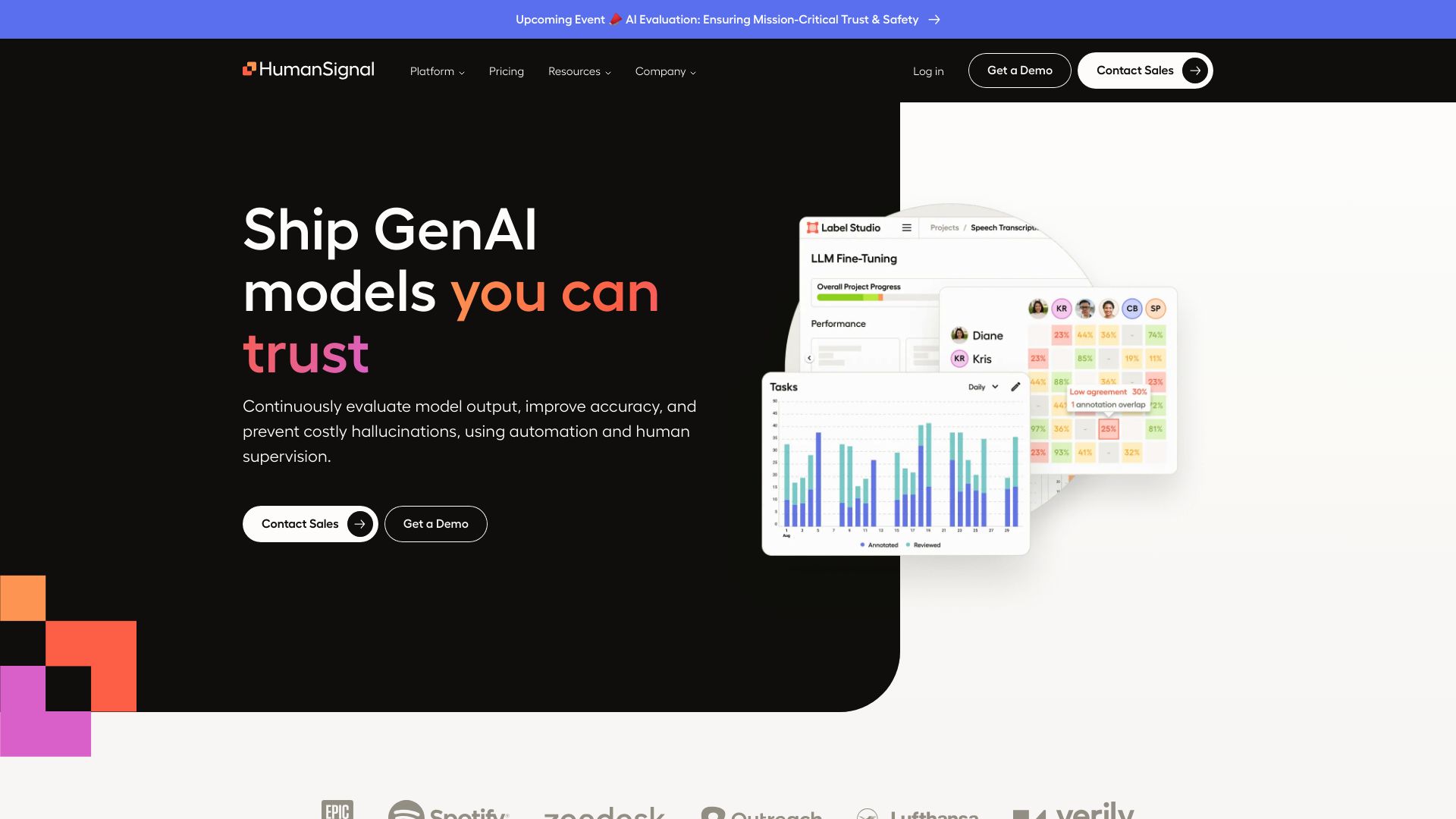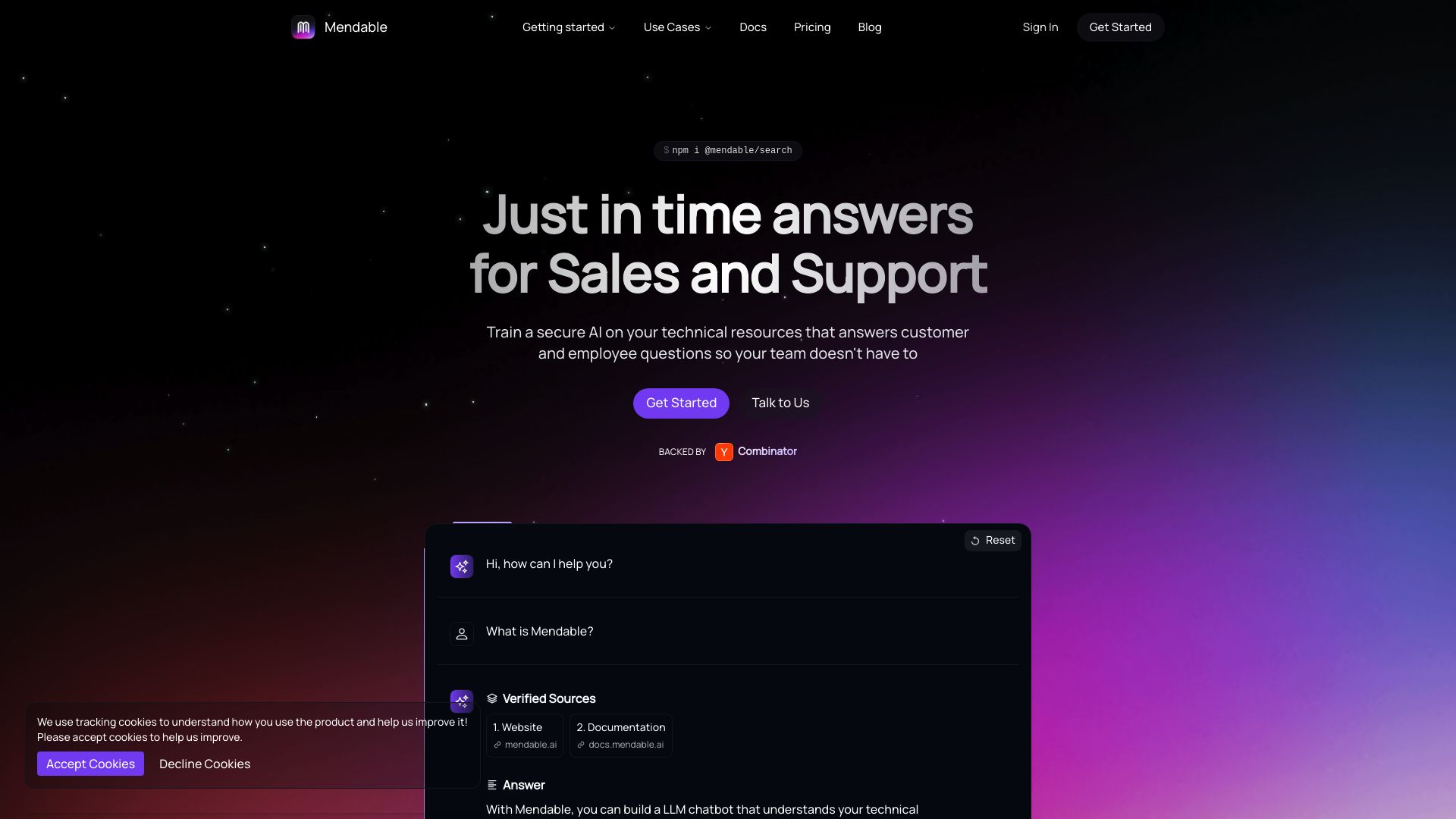Adala vs. Mendable: AI-Powered Data Processing Compared
AI frameworks revolutionize data processing and information retrieval, empowering businesses to harness the full potential of their digital assets. This comparison between Adala vs. Mendable explores Adala’s autonomous data labeling agents and Mendable’s chat-powered search components, examining their unique approaches to AI-driven solutions.
We delve into the strengths and limitations of each platform, evaluating their core functionalities, integration capabilities, and target use cases. Our analysis also introduces SmythOS, a comprehensive AI development platform that surpasses both in versatility and scalability. By the end, you’ll understand how these tools address different AI challenges and which solution best fits your organization’s needs for efficient data handling and information access.
Adala Overview
Adala offers an open-source framework for building autonomous data labeling agents. This platform empowers developers to create AI agents that acquire and refine labeling skills through continuous interaction with data and human feedback.


Adala utilizes large language models like GPT-3 as the core runtime for agents, enabling them to execute specialized skills such as text classification, summarization, and question answering. The modular architecture of Adala allows for extensibility, encouraging community contributions and customization.
Adala offers an open-source framework for building autonomous data labeling agents… that acquire and refine labeling skills through continuous interaction with data and human feedback.
A key strength of Adala lies in its learning capabilities. Agents learn from labeled ground truth datasets provided by users, allowing for guided training processes. The platform incorporates human feedback mechanisms, enabling agents to refine their predictions and maintain high reliability through iterative improvement.
While Adala excels in autonomous data labeling tasks, it lacks some features found in more comprehensive AI development platforms. The absence of a visual builder or no-code editor may present challenges for users without strong programming skills. Additionally, there’s no explicit mention of multimodal capabilities or specific integrations with services like Hugging Face or Zapier.
Despite these limitations, Adala’s focus on creating efficient, cost-effective, and high-quality data labeling solutions positions it as a valuable tool for organizations dealing with large-scale data processing tasks. Its open-source nature and emphasis on community involvement foster ongoing innovation and adaptability in the rapidly evolving field of AI-assisted data labeling.
Mendable Overview
Mendable empowers developers and businesses with chat-powered search components that deliver accurate, contextual answers based on existing documentation. These AI-driven tools seamlessly integrate into applications through Mendable’s API or pre-built components for platforms like React and Docusaurus.


Mendable empowers developers and businesses with chat-powered search components that deliver accurate, contextual answers based on existing documentation.
Mendable’s key features include customizable components such as search bars, floating buttons, and chat bubbles. Users can tailor AI responses through prompt templates and dynamic variables, enhancing relevance and clarity. The platform supports auto-syncing from various data sources, ensuring up-to-date information. Metadata filtering provides precise control over response generation.
For developers seeking advanced customization, Mendable offers robust APIs and SDKs. The platform also includes Product Copilots—tailored components that provide context-aware answers within applications. Integration options extend to popular platforms like Slack, Discord, and WordPress, expanding Mendable’s versatility.
While Mendable excels in delivering accurate search results and integrating with existing systems, it may have limitations in areas like autonomous agent capabilities or extensive multimodal support. The platform’s focus on search and retrieval might not fully address needs for complex problem-solving or multi-agent collaboration.
Mendable’s vision centers on streamlining information delivery through AI-powered search, aiming to enhance user support and engagement across various platforms. This approach aligns well with businesses seeking to improve documentation accessibility and customer self-service capabilities.
Feature Comparison
Adala and Mendable offer distinct approaches to AI-powered solutions, with notable differences in their core functionalities and target use cases. Adala focuses on autonomous data labeling, while Mendable specializes in AI-driven search and retrieval.
Adala’s strength lies in its open-source framework for building autonomous data labeling agents. It leverages large language models to execute specialized skills like text classification and summarization. The platform emphasizes continuous learning through interactions with data and human feedback, making it ideal for organizations dealing with large-scale data processing tasks. However, Adala lacks a visual builder or no-code editor, potentially limiting accessibility for non-technical users.
In contrast, Mendable excels in delivering accurate, contextual answers based on existing documentation through chat-powered search components. It offers customizable UI elements and supports integration with popular platforms like Slack and WordPress. While Mendable provides robust APIs and SDKs for developers, it may have limitations in areas like autonomous agent capabilities or extensive multimodal support compared to more comprehensive AI development platforms.
Both platforms have gaps in certain security features. Neither explicitly mentions data encryption or OAuth implementation, which could be concerns for organizations with strict security requirements. Additionally, the absence of IP control features in both platforms may limit deployment options for some enterprises.
| Adala | Mendable | SmythOS | |
|---|---|---|---|
| CORE FEATURES | |||
| Hosted Agents (Dev, Production) | ❌ | ❌ | ✅ |
| Environments (Dev, Production) | ✅ | ❌ | ✅ |
| Visual Builder | ❌ | ❌ | ✅ |
| No-Code Options | ❌ | ❌ | ✅ |
| Autonomous Agents | ✅ | ❌ | ✅ |
| Debug Tools | ❌ | ❌ | ✅ |
| Multimodal | ❌ | ❌ | ✅ |
| Multi-Agent Collaboration | ❌ | ❌ | ✅ |
| Audit Logs for Analytics | ❌ | ✅ | ✅ |
| Work as Team | ✅ | ❌ | ✅ |
| Agent Work Scheduler | ✅ | ❌ | ✅ |
| SECURITY | |||
| Constrained Alignment | ✅ | ❌ | ✅ |
| Data Encryption | ❌ | ✅ | ✅ |
| OAuth | ❌ | ✅ | ✅ |
| IP Control | ❌ | ❌ | ✅ |
| COMPONENTS | |||
| Foundation AIs | ✅ | ❌ | ✅ |
| Huggingface AIs | ❌ | ❌ | ✅ |
| Zapier APIs | ❌ | ❌ | ✅ |
| All other APIs, RPA | ❌ | ✅ | ✅ |
| Classifiers | ✅ | ❌ | ✅ |
| Logic | ✅ | ❌ | ✅ |
| Data Lakes | ❌ | ❌ | ✅ |
| DEPLOYMENT OPTIONS (EMBODIMENTS) | |||
| Deploy as Webhook | ❌ | ❌ | ✅ |
| Staging Domains | ❌ | ❌ | ✅ |
| Production Domains | ❌ | ❌ | ✅ |
| API Authentication (OAuth + Key) | ❌ | ✅ | ✅ |
| Deploy as Site Chat | ❌ | ✅ | ✅ |
| Deploy as Scheduled Agent | ❌ | ❌ | ✅ |
| Deploy as GPT | ✅ | ❌ | ✅ |
| DATA LAKE SUPPORT | |||
| Hosted Vector Database | ✅ | ❌ | ✅ |
| Sitemap Crawler | ❌ | ❌ | ✅ |
| YouTube Transcript Crawler | ❌ | ✅ | |
| URL Crawler | ❌ | ❌ | ✅ |
| PDF Support | ❌ | ✅ | ✅ |
| Word File Support | ❌ | ✅ | ✅ |
| TXT File Support | ❌ | ✅ | ✅ |
Best Alternative to Adala and Mendable
SmythOS stands out as the superior alternative to Adala and Mendable for AI agent development and deployment. Our platform offers unparalleled versatility, ease of use, and a comprehensive feature set that addresses the limitations of both competitors.
We provide a robust visual builder and no-code options, making AI agent creation accessible to users of all technical backgrounds. This contrasts sharply with Adala’s lack of visual tools and Mendable’s limited customization options. Our intuitive interface allows rapid development and deployment of sophisticated AI agents without sacrificing functionality.
SmythOS stands out as the superior alternative to Adala and Mendable for AI agent development and deployment. Our platform offers unparalleled versatility, ease of use, and a comprehensive feature set…
Our platform excels in multimodal capabilities, supporting various data types including text, images, and audio. This versatility enables the creation of more advanced and context-aware AI agents compared to Adala’s focus on text-based labeling or Mendable’s primarily text-centric search components. SmythOS agents can handle complex, real-world scenarios across multiple domains.
Unlike Adala and Mendable, we offer comprehensive deployment options. Users can deploy AI agents as APIs, webhooks, scheduled tasks, or integrate them directly into websites and applications. This flexibility ensures that SmythOS can adapt to virtually any use case or industry requirement, from enhancing customer support to automating complex business processes.
Security and scalability set SmythOS apart. We implement robust data encryption, OAuth authentication, and IP control features, addressing the security gaps in both Adala and Mendable. Our platform is built to scale, supporting enterprise-level deployments while maintaining performance and reliability. This makes SmythOS the ideal choice for businesses of all sizes, from startups to large corporations seeking to leverage AI technology effectively.
Conclusion
Adala and Mendable offer specialized AI solutions for data labeling and information retrieval respectively. Adala’s open-source framework excels in creating autonomous data labeling agents, while Mendable’s chat-powered search components deliver contextual answers from existing documentation. However, SmythOS surpasses both with its comprehensive AI development and deployment capabilities.
SmythOS provides a versatile platform for creating, managing, and deploying AI agents across various environments. Its intuitive drag-and-drop interface, extensive integration options, and support for multiple AI models make it accessible to both developers and non-technical users. SmythOS’s ability to handle complex workflows, support multi-agent collaboration, and deploy agents as APIs, chatbots, or scheduled tasks sets it apart from more specialized solutions.
For organizations seeking a robust, scalable AI platform that can adapt to diverse use cases, SmythOS is the clear choice. Its features span from visual building and debugging tools to advanced security measures and data lake support. To experience the full potential of AI agent development and deployment, create a free SmythOS account and explore how our platform can transform your AI initiatives.
Last updated:
Disclaimer: The information presented in this article is for general informational purposes only and is provided as is. While we strive to keep the content up-to-date and accurate, we make no representations or warranties of any kind, express or implied, about the completeness, accuracy, reliability, suitability, or availability of the information contained in this article.
Any reliance you place on such information is strictly at your own risk. We reserve the right to make additions, deletions, or modifications to the contents of this article at any time without prior notice.
In no event will we be liable for any loss or damage including without limitation, indirect or consequential loss or damage, or any loss or damage whatsoever arising from loss of data, profits, or any other loss not specified herein arising out of, or in connection with, the use of this article.
Despite our best efforts, this article may contain oversights, errors, or omissions. If you notice any inaccuracies or have concerns about the content, please report them through our content feedback form. Your input helps us maintain the quality and reliability of our information.
